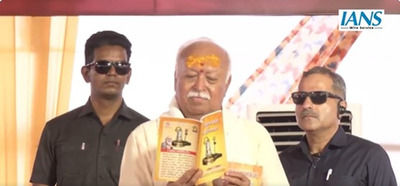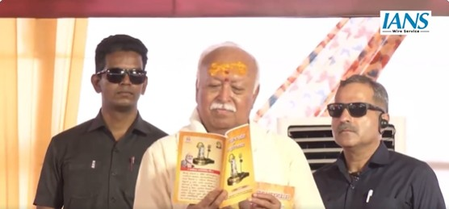

Dharampur (Gujarat), April 12 (IANS) Rashtriya Swayamsevak Sangh (RSS) Chief Mohan Bhagwat on Saturday addressed a large gathering at the silver jubilee celebrations of Barumal Dham, a spiritual centre located in the tribal heartland of Dharampur in Gujarat's Valsad district.
The event coincided with Hanuman Jayanti, adding a profound symbolic significance to the occasion.
Speaking before a crowd that included saints, spiritual seekers, and community leaders, Bhagwat emphasised the need for India to stand firm in its 'Dharma' (righteousness) and lead the world by example.
"India must stand firm on its Dharma, lead a virtuous life, and set an example," Bhagwat said, adding, "That's why centres like the one Swamiji has been running for the past 25 years under the grace of Lord Bhav Bhaveshwar are necessary. More such centres are needed."
He lauded the efforts of saints and spiritual leaders who, in his words, "travel deep into forests, settle in remote areas, and alongside spiritual teachings, try to arrange whatever support they can for the people's daily lives."
Barumal Dham, with its 25-year legacy of spiritual and social service, was presented as a shining example of this ethos.
The occasion being Hanuman Jayanti, Bhagwat drew parallels between the ideals of 'Seva' (service) and the unwavering Dharma symbolised by Lord Hanuman and Lord Ram.
Referring to a well-known Sanskrit shloka, the RSS Chief said: "Ram's work is Dharma. 'Ramo vigrahvaan dharmah' -- Ram is the embodiment of Dharma. So our learning, our qualities, our cleverness -- all must be used in the service of Ram's cause, the cause of righteousness."
Underscoring the importance of unity and moral fortitude, Bhagwat said: "We know how to unite, and we want to unite. We do not want to fight or create conflict, but we must protect and preserve. This protection and preservation must continue, as it has since the beginning of time."
He went on to evoke the Mahabharata, warning against the temptations of power that can lead to Adharma, citing Duryodhan's actions in the Pandavas' kingdom as a cautionary tale.
"Today, powers change, but the essence remains the same. In the pursuit of power, we must ensure that our conduct remains pure and righteous."
Reflecting on India's civilisational ethos, Bhagwat said that Dharma is not a religion in the conventional sense but the universal principle that governs all things -- from governance to personal conduct.
"Our society is vast and has existed since ancient times. From great saints to common people, everyone, due to our tradition, carries the essence of Dharma. Those who embody the spirit of Dharma need to be revered."
--IANS
janvi/khz